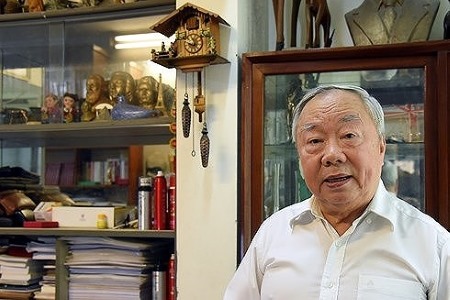.jfif) Opinion
Opinion

Former chairman of the National Assembly Committee for External Affairs and former head of the National Assembly office Vũ Mão speaks to Kinh tế & Đô thị (Economic & Urban Affairs) newspaper about the promulgation of the Party Central Committee’s Regulation No 11-QDi/TW on the party officials' responsibility for holding talks with ordinary people
 |
| Former head of the National Assembly office Vũ Mão. |
Former chairman of the National Assembly Committee for External Affairs and former head of the National Assembly office Vũ Mão speaks to Kinh tế & Đô thị (Economic & Urban Affairs) newspaper about the promotion of the Party Central Committee’s Regulation No 11-QDi/TW on the party officials’ responsibility for holding talks with ‘ordinary people’.
Reluctance to talk directly with local residents was one reason for discontent and complaints. How do you think about the Party Central Committee’s issuance of the Regulation No 11 [on February 18]?
It’s not the first time such a regulation was made public. Officials’ responsibility for "getting in touch with ordinary people” has been embodied in legal documents for years, notably the Law on Reception of Citizens which says the head of a locality must meet with voters as regulated. In reality in some localities, top officials are still invisible to ordinary people and in many cases, assigned tasks to their deputies.
The Party Central Committee issued Regulation No 11 detailing on the responsibility of heads of party committees for talking with citizens face to face and properly responding to their claims. This is good news for me and many ordinary people. The regulation is necessary as it details principles, purposes and the time schedule for meeting with local people. Obviously, it is compulsory that party officials cannot refuse to talk to the locals.
Despite existing regulations, certain officials managed to ignore "seeing the ordinary people face to face". From your own experience as a National Assembly deputy for many years, what is the reason?
As far as I’m concerned, it’s because a lack of sanctions which are binding on all officials’ responsibility. There is a fact that those who did well were not praised while who failed were not penalised. Many officials often reasoned they were so busy that they were unable to have a direct dialogue with local people.
Additionally, some mechanisms and policies remain incomplete, non-synchronous and impractical. Corrupt acts have not been properly dealt with, making "talking to people to listen to their complaints" ineffective. And in many cases, officials failed to settle the appeals thanks to "cumbersome" elements, so officials hesitate to have further direct talks with ordinary people.
I think the real matter is that officials are not well aware of the importance of "listening and talking to the people”. In most cases, they have focused on responding to the people’s petition without showing real concern to help solve the issue completely.
Some believe that seeing ordinary people face to face is a test of officials’ qualifications and capability. What do you think?
It’s true. Quality of direct talks with ordinary people is crucial as it directly affects the settlement of matters of people’s great concern. Officials with limited capability and poor work performance often hesitate to directly communicate with people. They possibly make promises but leave the problem unresolved.
Facing people’s pressing matters also requires official’s "patience". To be patient enough to listen to the people is one of necessary skills that authorities must have.
Do you think the Regulation No 11 can help solve existing shortcomings?
It is normal that petitioners just want to see the top leaders or competent authorities of the locality to help solve their problems. That the Party Central Committee make compulsory the responsibility of party officials for communicating with local people demonstrates an advanced step forward. The Regulation No 11 clearly regulates that the head of a province and district’s party committee to meet local citizens once a month, while the head of the commune’s party committee hold the meetings twice a month; and in complicated and prolonged cases meetings with people can take place unexpectedly.
Of note, for the first time sanctions are mentioned. The head of a locality’s party committee must be held responsible if he/she fails to solve a problem which then leads to petitions to higher-level authorities by a group of people, which results in violations and social disorder.
It can be seen that the Party has had clear guidance and directions. Therefore, combined with the increase understanding of each individual and available regulations, the newly-issued regulation will be practical and bear fruits.
How can the regulation come into real life?
Besides the dissemination of the regulation, it is necessary to increase inspection and supervision in the Party system and strengthen coordination from law enforcement bodies and other social-political organisations. Also it is significant to clarify the relationship between head of party committees with the local administrative agency which is in charge of receiving people.
Head of party committees must assign specific tasks for lower-level relevant authorities to help solve issues raised by ordinary people timely and appropriately. And report, inspection on and supervision of the results of settling petitions is a must. — VNS